Back in October 2013, Cassandra wrote a post about writers’ frustrations, sexual come-ons, and the hopeful hopelessness of the national navy in landlocked Bolivia. It’s a post so deeply horrible and so deeply sweet that we thought you’d like to read it again.
For every story that makes it to print, there are scads that die in the reporting trenches. This is one of those stories.
In 2001, I moved to Bolivia to become a Peace Corps volunteer and fell deeply in love with the country. In 2010, I returned. I wanted to visit friends and family, but, like any intrepid freelancer, I also hoped to do some reporting. Although Bolivia has been landlocked since it lost its coastline to Chile more than 130 years ago, the country still maintains a navy. This is their motto: “The sea belongs to us by right, recovering it is a duty.” I find this sentiment simultaneously ridiculous and sort of commendable. So why not do a story on Bolivia’s navy, I thought. (Well, lots of reasons. But I didn’t let details deter me.)
The first order of business was making contact. I found a Web page for the navy, but it seemed to be broken. And all other attempts to arrange an interview ahead of time failed. So I developed a two-part backup plan. 1. Fly to Bolivia. 2. Call the navy. And that’s exactly what I did. With help from the hostel desk clerk, I called naval headquarters. “Come on over,” said the man on the phone. So I hopped in a cab and went.
The Armada Boliviana has its headquarters in a nondescript 10-story building in La Paz, a city that lies 4,000 feet above sea level and about 400 miles from the closest coast. I rolled up to the security gate, told them I was a journalist, and explained that I had an appointment. “Who are you here to see?” the security guard asked. Good question. Mistake number one: I had failed to get the name of the man who told me to show up. “Perhaps you’re here to see the Comandante General?” the guard asked. “Perhaps I am,” I said. Wrong answer. Men in Ray Bans and dark trench coats flooded out of the building. Their leader had a secret service earpiece. Confusion reigned as I tried to explain myself in increasingly flustered and broken Spanish. Finally I thought to give them the phone number the man had given me.
Twenty minutes later I found myself in a room with a naval officer named Ricardo. He seemed befuddled by my presence. “Would you like to go on a tour and see some of the sights of Bolivia?” he asked, handing me a brochure with a picture of a small cruise ship. I scanned the page. “Our attention is personalized so that you will feel quality and comfort similar to what you would feel in your own home, allowing you to enjoy your stay and absorb the energies of the sacred-mystic Lake Titicaca,” it read. Now I was befuddled. When did the navy start using its ships for tourist cruises? “No, I’m not here as a tourist,” I explained. “I’d like to do a story about the navy. I’d like to visit a naval base, and perhaps interview an official.”
And so it was arranged. I would return to La Paz on March 23rd for the big “Day of the Sea” celebration, when the country reflects on the terrible loss of its coast and proclaims vengeance on Chile. Ricardo would get me an interview with the Comandante General, the head of the navy. He walked me out of the building. “One last thing,” he said. “Would you like to have dinner?”
Would I? No, I wouldn’t. But I also didn’t want to jeopardize my interview with the Comandante. “Ok,” I agreed. “Let’s have dinner. You can tell me more about the navy.”
We met in the Plaza Murillo, and I could see immediately that I had miscalculated. Ricardo arrived in a navy blue blazer and a stifling cloud of aftershave. A gold chain glistened above the V of skin visible through his partially unbuttoned shirt. He kissed my cheek, and we hailed a cab. A few minutes later we arrived at the restaurant, and now there was no mistaking Ricardo’s intent. He had chosen a Chinese restaurant/dance club/karaoke bar called “Love City.” I’m not translating here. The name was in English. And that was how I found myself on a date with a married, fifty-something Bolivian naval officer.
Ricardo ordered tall beers and sweet and sour chicken (for the both of us) as I tried to put some professional boundaries on an evening that seemed suddenly out of my control. “Let me tell you about my husband.” “I am so interested in Bolivia’s navy.” “How nice that we can have dinner as professionals.” “Let me tell you more about my husband.” “Please tell me about your wife.” These tactics failed miserably. I tried a more direct message. “I am married and you are married, so there’s nothing between us except friendship,” I said. “We’re professionals.”
Ricardo adopted a wounded expression. “Are you losing confidence in me?” he asked. “I can’t believe that you think we came here for anything more. I have a wife!” he snapped. But soon his hand crept to my knee. I threatened to leave. Instead we ended up in the karaoke bar. “One song and then we’ll go,” he promised. He chose a ballad about unrequited love.
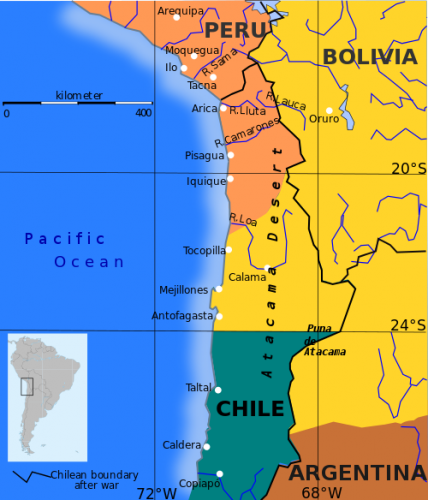
Bolivia lost its 400 miles of coastline in 1879 when Chilean forces occupied Antofagasta, the main city in a region rich in saltpeter. The invasion launched what became known as the War of the Pacific. “Bolivia was totally unprepared for war, especially one so distant from its population centers and resource base, and suffered from grossly irresponsible leadership,” writes Waltraud Q. Morales in A Brief History of Bolivia. In 1884, Bolivia signed a treaty ceding control of the coast to Chile. Another treaty in 1904 allowed Chile to annex the stolen property. This was more than a century ago, but Bolivians know how to hold a grudge. They never forgot the injustice, and diplomatic relations between the two nations have remained frosty ever since.
And they’re not likely to thaw any time soon. Bolivia has been demanding that Chile return its coastline for decades. And earlier this year, the country brought its grievances to the Hague.
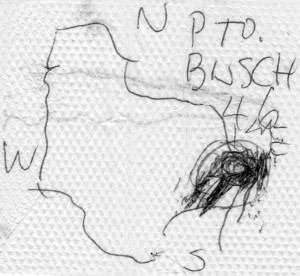
After six beers, three songs, and several attempted gropes, Ricardo offered his perspective on the issue. Because Bolivia’s eastern border butts up against the Rio Paraguay, which flows into the Paraná River, which flows into the Atlantic ocean, well . . . Bolivia already has a coast, he said. And then he drew me a diagram on a napkin. That rat’s nest of pen marks represents Bolivia’s 46-kilometer-long “coastline,” which boasts a barely populated outpost called Puerto Busch. By that logic, Bismarck, North Dakota, is a coastal city too.
The evening ended poorly. I grudgingly shared Ricardo’s cab. But when he offered to come up to my room, I declined. I did return to La Paz for Day of the Sea, but I couldn’t bring myself to phone Ricardo. I attended the parade alone, and never interviewed the Comandante. Instead I forced myself to do man-on-the-street interviews. (In English, I find these conversations merely uncomfortable. In Spanish, they were utterly humiliating.)
The Bolivians at the parade talked about the importance of having a seaport for exporting products, but they also lamented the loss they suffered in 1879. It still stings. “Before we had the Pacific Ocean, and now, no. It’s important to recover what was once ours,” said one woman.
I never wrote this story. I never even pitched it. But if I had, maybe this is how I would have ended it. It’s easy to poke fun at a landlocked navy. But Bolivians couldn’t be prouder of these men. In a country that has been fractured by protests, politics, and rampant racism, the sea is a uniting force and a symbol of hope. Life was better once, and it can be again . . . if only greedy Chile would give Bolivia back its goddamn sea.
***
There’s no shortage of stories on the Bolivian navy. My favorite lede comes from The Guardian: “Sunlight glinted off the lake, a scenic expanse on the roof of South America, and Bolivia’s navy was busy perfecting the art of yearning.” Find the full story here. Also see these:
Bolivian navy’s dream comes ashore
Landlocked navy prepares to put to sea
Bolivia Reaches for Slice of the Coast that Got Away
All photos by Cassandra Willyard except the map of Bolivia (courtesy of Wikimedia commons) and the napkin (courtesy of Ricardo)
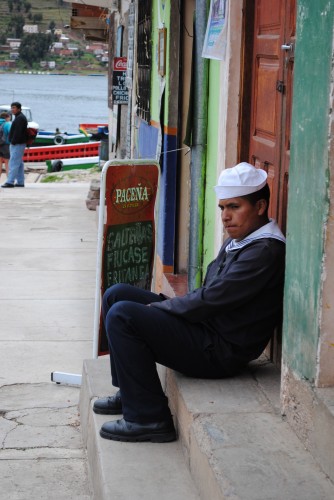
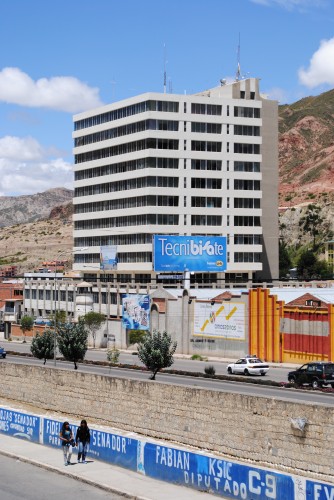

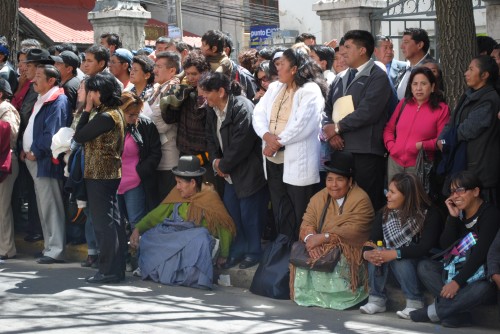
I had a bit of cognitive dissonance at the phrase “landlocked Brazil” – the article is actually about Bolivia.
[warning, my extended family is Chilean].
Very interesting article! The War of the Pacific, which is essentially unknown here in the US, is still of vital interest in the Southern Cone. I think that a neutral version of the war would state that Bolivia imposed a tax on Chilean companies operating in Bolivia, in contradiction to a treaty between the countries. Chile protested, and Bolivia claimed that the dispute must be settled in Bolivian courts and not by international arbitration. Chile then claimed that the border treaty with Bolivia was therefore voided (a dubious claim), and sent troops to occupy Antofagasta. Unknown to Chile, Bolivia and Peru had signed a treaty that the other country would come to its aid in case of war, bringing Peru into the fracas. Argentina was also in secret negotiation with Bolivia being the eternal enemy of Chile, and while officially remaining neutral, did provide scant aid to Bolivia and Peru.
With the occupation of Antofagasta by Chile, the war started, and I think to everyone’s surprise, including Chile, the Chileans won the war. Peru and Bolivia were forced to sign a treaties (1904 and 1929) ceding land to Chile. The Chilean navy was trained by the the British Admiral Lord Cochrane which perhaps explains the victory, and to this day, all Chilean navy officers speak fluent English and wear British Admiralty uniforms.
I lived in La Serena Chile for over 20 years, and the War of the Pacific, while known by all Chileans, had lost its primacy in their daily lives. In my city, there were reminders of the war – in one plaza are a series of rather treacly rococo statues stolen by the Chilean army from Lima and gifted to the city. Almost no one knows where they came from anymore, and they stand there, in uncomfortable alabaster poses from another century.
During the dark days of the Pinochet dictatorship, like all populist dictators Pinochet sought to find issues that would unite the country and make them forget the awful events going on in Chile. His government hit upon a clause in the 1904 treaty that stated that any land transfer from Chile to Peru/Bolivia must be approved by both countries. If you look at a map, you can see that the logical piece for Chile to give to Bolivia would be a strip of land at the northern border with Peru. However, the crafty Pinochet knew that he was giving a piece of land to Bolivia that once belonged to Peru. He could “innocently” say that his government was trying to give access to the sea to Bolivia, knowing full well that the piece of land that would be given to Bolivia used to be Peruvian, and the Peruvians would never agree to giving up their previous territory. Pinochet could sit back and say that he a man of peace trying to find the best solution and look at these backward countries (Bolivia and Peru) – they are not trying to solve the problem. “We are willing to give up part of our country to solve the access to the sea problem for Bolivia” – but knowing full well that Peru would never agree to a strip of land at the northern border at “Hito 1” that was once theirs.
So that is where it stands. Bolivia has somehow convinced the World Court to hear their case, but it is almost impossible that the court will grant access to the sea to Bolivia by cutting what is now modern Chile into two pieces near Antofagasta. The logical thing to do is to give access at the north of Chile leaving Chile in one piece, something that Peru will never agree to.
Many years ago I visited Bolivia, which is a very poor country, but a beautiful country very rich in culture and humanity. Bolivians are wonderful people. I discovered, as did the author of the piece above, that the War of the Pacific is still a daily issue in Bolivia. But that was not on my mind. I love Andean music and some of the greatest Andean music comes from Bolivia. I wanted to buy a cassette of a folklore group called Los Kyarkas. (you should listen to their music – it is awesome). Having been in Bolivia for two weeks and learning that is not wise to mention that you live in Chile, I was amazed to see the Chilean group “Illapu” also sold in the music shop. Their song “Vuelvo” became the anthem of the return of democracy to Chile. It was the first Chilean thing I had seen in Bolivia. Sort of joking with the proprietor, I mentioned that I did not expect to see Chilean music sold in Bolivia. With absolutely no irony or amusement, he answered “They are not Chilean. They are from Antofagasta.”
The war was over 100 years ago, but it is still fresh in the minds of Bolivians, who passionately seek an exit to the sea, and the longing for the sea is in every Bolivian’s soul.
One final cultural footnote. Until I lived abroad, I never realized how important it is for the US to always be the “winner.” We define ourselves by our exceptionalism. We win all the wars. We have to be the best in everything. Trump is a distillation of this persona – never apologize, never stop bragging. When I lived in Australia, it took me a while to understand how a *defeat* – in WWI – could define the character of the country, because at Gallipoli, the Aussies discovered that there was a difference between being part of the empire and being British.
Similarly in Chile, they still celebrate the battle of Iquique, where the major naval battle between Chile and Peru was fought. And while the Chileans lost, this date is a national holiday. Arturo Prat, the Chilean naval commander, according to most naval historians, lost the battle because he did not take the Chilean fleet out to deep water, but kept them in the bay to fight, even though the Chilean fleet was not easily maneuverable in close quarters compared to the Peruvians. His bad naval judgement led to the total defeat of the Chilean navy. Chileans even joke about this. There is a famous painting in Chile of Prat jumping onto the Peruvian ironclad Huascar, looking over his shoulder holding his sword to the front as if telling his marines to follow him. Chileans, however, with their characteristic irony, joke about the painting and say that what he is really is saying is “Who pushed me??” It is refreshing to live in countries where even the stories of those who lost are an important part of the national character. Maybe we hunger that too in the US, which is why there are so many Chicago Cubs fans.